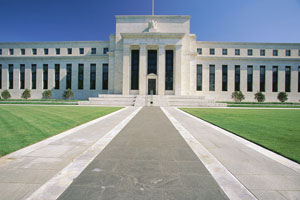The U.S. Federal Reserve released the minutes of last month's Federal Open Market Committee (FOMC) meeting today. But don't get distracted by the typical Fedspeak in today's minutes - there are much more important investment considerations to make based on central bank activity.
Today's meeting minutes reiterate how the Fed ended QE3 last month, the massive bond-buying program that grew the Fed balance sheet by $1.7 trillion in assorted bonds. And the Fed continues to echo the same tired refrain that interest rates will remain low for a "considerable" period.
 But the Fed is being purposely vague.
But the Fed is being purposely vague.
Fed Chairwoman Janet Yellen knows the potential her words - and her cohorts' words - have to move markets:
- Remember when she mistakenly said it could take six months after the end of QE3 for rates to hike and the markets shook in panic?
- Remember when she rattled the biotech sector by making a very myopic and broad proclamation that it was overvalued?
- Remember when her Fed colleagues took to the airwaves and the press with encouraging statements about the interest rate hikes, all because they didn't want a very necessary market correction last month to shake too much value out of the Dow?
Investing on the words of the Fed is a fool's errand. The Fed has no interest in quelling market uncertainty surrounding interest rate hikes.
The Fed is greedy.
It wants to act as though it's pursuing sensible monetary policy, independent of the markets, while also doing everything in its power to make sure markets stay red hot.
That's why as a long-term investor looking for long-term value, it's best to not hang on the words of the Fed like the broader markets seem to do.
Instead, you can invest without the noise if you focus on two types of investments that can survive - and even gain from - whatever the Fed deals to the markets.
Investments That Don't Play the Fed's Game
The first consideration to make as an investor is: which companies are "nice-to-have," and which are "need-to-have"?
Money Morning Chief Investment Strategist Keith Fitz-Gerald points to companies in the social media space as "nice-to-have." Think Facebook Inc. (Nasdaq: FB), Groupon Inc. (Nasdaq: GRPN), or Zillow Inc. (Nasdaq: Z).
All these companies look exciting because they are brand names that we see every day while surfing the internet. But they're really only websites. They are flashy and fun, but they aren't delivering an important need in line with a global trend. They aren't running solid balance sheets. And they are easily replaceable.
This contrasts with the "need-to-have" investments, which are the opposite. They are addressing global trends and fulfilling a widespread need.
Just look at ABB Ltd. (NYSE ADR: ABB). This Swedish multinational energy and utility company is going to be a crucial player in keeping the lights on as the global electrical grid expands in developing countries and emerging markets.
Or take Raytheon Co. (NYSE: RTN). This defense contractor has been innovating for most of the 20th century through today. RTN is always looking for opportunities to deliver invaluable technologies, whether their engineers are inventing the microwave in the 1940s, or their missiles are being used to topple rogue regimes and extremists abroad.
Those are just two companies with a global presence, and a promise of returns in the long run.
They aren't shackled by the words of the Fed. They will grow whether the Fed gives us a clear interest rate picture or not. Or if Fed interest rate tinkering plunges us into economic calamity.
Besides reinforcing the importance of the "need-to-haves," today's FOMC minutes highlight even more profit opportunities, tied to global central banking.
The Best Profit Play on Central Banking
That is, the currency markets.
The U.S. is winding down its quantitative easing. But other central bankers are just embarking on, or expanding aggressively upon, easing policies.
The Bank of Japan is one.
Just this week it was discovered that the Asian country, amid its two-decades-long battle with deflation, is slipping into recession. This came right after the Bank of Japan announced that it would up its annual bond-buying of 70 trillion yen a year, to 80 trillion yen a year.
Japan needs inflation to spur demand and reverse this deflationary trap. That's why you can expect the yen to fall in months ahead.
Fitz-Gerald sees a USD/JPY rate to rise to 200 in the next two years. It is currently at close to 118. It's rising fast, so the sooner you jump in on the ProShares UltraShort Yen ETF (NYSE Arca: YCS), an exchange-traded fund whose share price rises whenever the yen falls against the U.S. dollar, the better.
Much the same can be said about buying the ProShares UltraShort Euro ETF (NYSE Arca: EUO), an ETF that aims to generate twice the inverse daily returns of the dollar price of the euro. The European Central Bank, unimpressed by the damage austerity has wrought in the Eurozone, is eyeing its own sovereign bond-buying campaign to curb the current troubling trend of disinflation.
It hasn't happened yet, but no one is fooled. Europe is heading toward becoming another Japan, and ECB president Mario Draghi is readying to fire up the printing press.
This is all while the U.S. unwinds.
The currency gains will be big as speculators pile into yen and euro shorts, and begin buying into the U.S. Dollar Index.
The Bottom Line: While the Fed's words shouldn't alone influence investment decision, its actions - and the actions of other central bankers - are serving up some great profit opportunities.
Uncertain About the Fed? You may be asking yourself with all the confusion surrounding interest rates if it's even worth being in the stock market right now. Our Chief Investment Strategist Keith Fitz-Gerald tells you why the right question is not "Should I be in stocks?" but "Where should I put my money to get the biggest bang for my buck?"...


